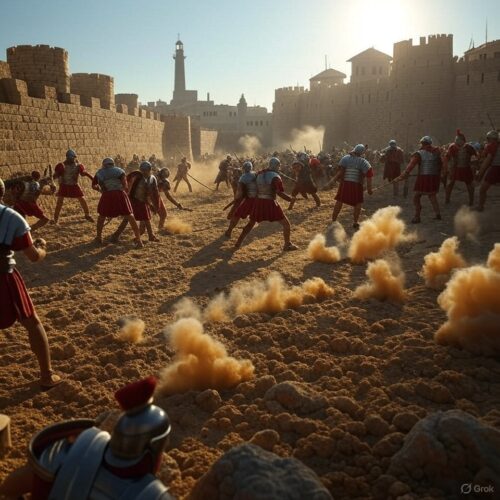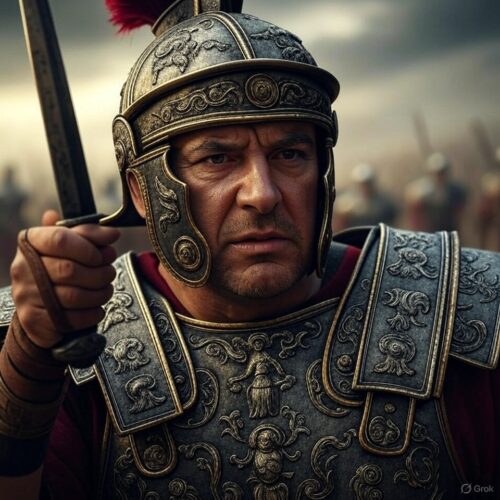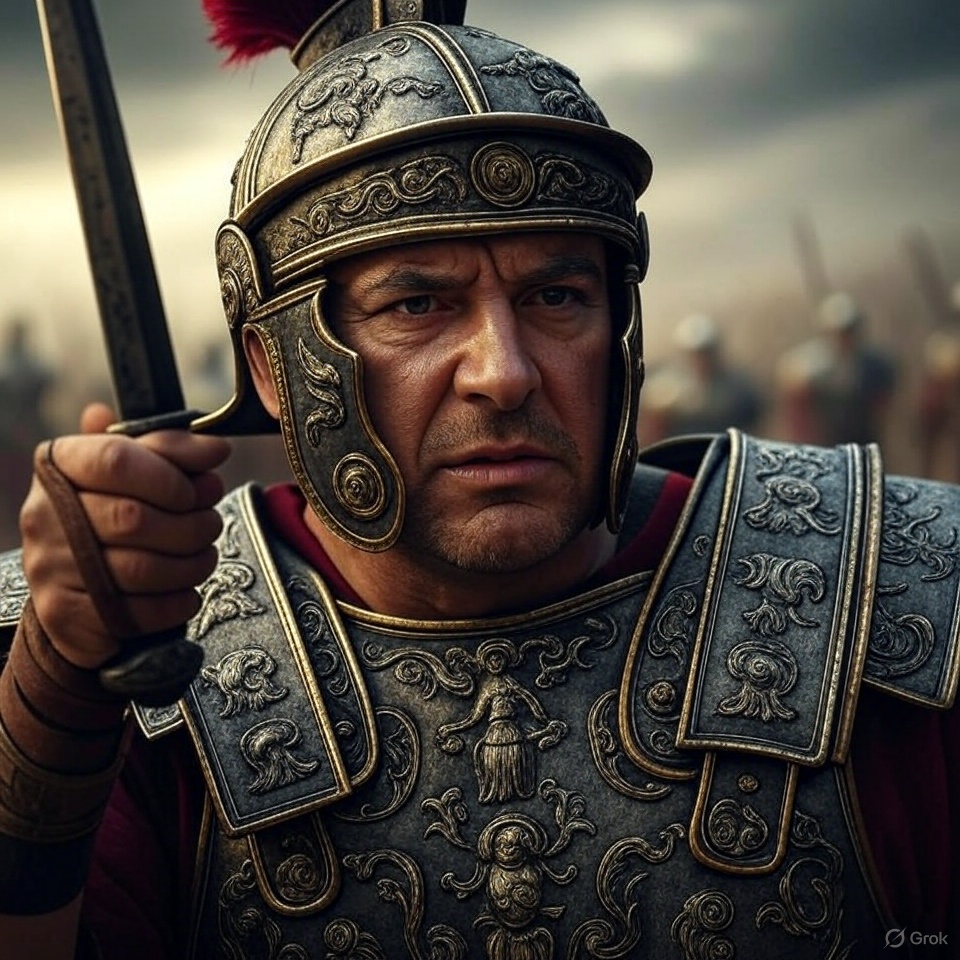Welcome to a journey back in time to the scorching sands of ancient Egypt, where the fate of empires hung in the balance on a single day. On July 31, 30 BC, the Battle of Alexandria unfolded, marking the dramatic climax of one of history’s most epic power struggles. This wasn’t just a clash of swords and shields; it was the final act in the tragedy of Mark Antony and Cleopatra, the end of the Roman Republic, and the birth of the Roman Empire under Octavian, who would become Augustus. In this blog, we’ll dive deep into the historical intricacies of that fateful day, exploring the political intrigue, military maneuvers, and human dramas that defined it. Then, we’ll bridge the centuries to show how the outcomes of this ancient battle can inspire and empower you in your daily life. Get ready for a blend of riveting history that’s more gripping than a Hollywood blockbuster, packed with facts to educate and entertain, and a motivational kick to help you apply these lessons today. Let’s march into the past!
The stage for the Battle of Alexandria was set years earlier, amid the chaos following the assassination of Julius Caesar in 44 BC. Caesar’s death left a power vacuum in Rome, leading to the formation of the Second Triumvirate: Mark Antony, Octavian (Caesar’s adopted heir), and Lepidus. These three men divided the Roman world among themselves, but alliances frayed quickly. Antony, a seasoned general known for his charisma and military prowess, took control of the eastern provinces. There, he fell under the spell of Cleopatra VII, the last pharaoh of Egypt’s Ptolemaic dynasty. Cleopatra wasn’t just a seductress as later Roman propaganda portrayed her; she was a brilliant strategist, fluent in multiple languages, and a ruler who had navigated alliances with Caesar himself to secure her throne.
By 32 BC, tensions boiled over. Octavian, consolidating power in the west, declared war on Cleopatra, framing it as a foreign threat to avoid directly attacking a fellow Roman like Antony. The real conflict was a civil war for supremacy. The decisive naval battle at Actium in 31 BC had already dealt a blow to Antony and Cleopatra’s forces. Their fleet was routed, and many allies deserted. Fleeing to Egypt, they spent the winter in Alexandria, the opulent capital of the Ptolemaic kingdom, a city renowned for its lighthouse (one of the Seven Wonders), vast library, and cosmopolitan vibe blending Greek, Egyptian, and Roman cultures.
As July 30 BC dawned, Octavian’s army approached Alexandria. Antony, now 53 years old and battle-hardened from campaigns in Gaul, Parthia, and Armenia, mustered his remaining troops. Estimates vary, but historians like Plutarch and Dio Cassius suggest Antony had around 10,000-12,000 infantry and a few thousand cavalry, bolstered by Egyptian forces loyal to Cleopatra. Octavian commanded a larger, more disciplined force of about 20,000 legionaries, fresh from victories and loyal to their young leader, who was only 33.
The battle commenced at dawn on July 31. Antony, ever the bold tactician, launched a surprise attack on Octavian’s positions outside the city walls. Positioning his infantry in a phalanx formation—a nod to Hellenistic warfare—and his cavalry on the flanks, Antony charged. The fighting was fierce, with Roman legionaries clashing in close quarters, swords slashing and shields bashing. Antony’s cavalry outflanked Octavian’s, routing them and pursuing the fleeing horsemen. Meanwhile, the infantry held firm, pushing back Octavian’s lines. By midday, Antony had achieved a tactical victory, capturing enemy camps and inflicting significant casualties.
But victory was illusory. As the sun set, whispers of betrayal spread through Antony’s ranks. Many soldiers, demoralized by previous defeats and lured by Octavian’s promises of clemency and pay, began to desert en masse. Plutarch describes how Antony returned to the city triumphant, only to find his army evaporating. Cleopatra, watching from the palace, had prepared for the worst, fortifying her mausoleum with treasures and provisions. The couple’s relationship, a mix of passion and politics, had produced three children, but now it faced its ultimate test.
The aftermath was swift and tragic. On August 1, believing a false rumor that Cleopatra had committed suicide, Antony stabbed himself with his sword. He was carried to her mausoleum, where he died in her arms. Cleopatra, captured by Octavian, negotiated for her children’s lives but ultimately took her own life on August 12, reportedly by asp bite—a symbol of Egyptian royalty. Octavian annexed Egypt as a Roman province, using its wealth to fund his reforms. He returned to Rome as the undisputed master, ushering in the Pax Romana, a 200-year era of relative peace and prosperity.
To understand the significance, we must zoom out to the broader context. The Final War of the Roman Republic (32-30 BC) was the culmination of decades of instability. After Caesar’s conquests expanded Rome’s territories, internal rivalries tore it apart. Antony’s eastern campaigns against Parthia had mixed results; he lost 20,000 men in a disastrous retreat in 36 BC but rebounded with Armenian victories. His “Donations of Alexandria” in 34 BC, where he distributed lands to Cleopatra and her children, outraged Romans, seeing it as betraying the Republic for a foreign queen.
Military tactics at Alexandria highlighted the evolution of warfare. Antony relied on heavy infantry and cavalry, influenced by his time in the east, while Octavian’s forces used disciplined legions with pilum javelins and gladius swords. The desertions underscore the importance of morale and propaganda; Octavian masterfully portrayed Antony as a debauched traitor enslaved by Cleopatra.
Culturally, Alexandria was a melting pot. Founded by Alexander the Great in 331 BC, it boasted the Pharos lighthouse, over 200 feet tall, guiding ships with its fire beacon. The Great Library held hundreds of thousands of scrolls, a hub of knowledge where scholars like Euclid and Eratosthenes worked. Cleopatra, descendant of Ptolemy I (Alexander’s general), ruled from the royal quarter, a complex of palaces and gardens.
The battle’s outcome reshaped history. Octavian’s victory ended the Hellenistic kingdoms, integrating Egypt’s grain supply into Rome, stabilizing food prices and enabling urban growth. As Augustus, he reformed the senate, built infrastructure like aqueducts and roads, and patronized arts, inspiring Virgil’s Aeneid. The Empire’s borders expanded, but at the cost of republican freedoms—senators became figureheads, and emperors wielded absolute power.
Diving deeper into personalities: Mark Antony, born in 83 BC, was a descendant of a noble family. His early life was wild; Cicero accused him of debauchery. He served under Caesar in Gaul, proving his valor at Alesia in 52 BC. As triumvir, he proscribed enemies, including Cicero, in bloody purges. His relationship with Cleopatra began in 41 BC in Tarsus, where she arrived on a golden barge, dressed as Aphrodite. Their alliance was strategic—Antony needed Egypt’s resources for Parthian wars, Cleopatra needed Roman protection against rivals.
Cleopatra, born in 69 BC, was Macedonian Greek, not Egyptian by blood, but embraced local customs, learning the language—the first Ptolemy to do so. She co-ruled with her brothers, navigating assassinations and exiles. Her charm captivated Caesar, bearing him Caesarion, whom she claimed as co-ruler.
Octavian, born Gaius Octavius in 63 BC, was shrewd and calculating. Ill during Actium, he relied on Agrippa for military success. His propaganda machine, including Horace’s odes, vilified Antony and Cleopatra, influencing Shakespeare and modern depictions.
The battle’s logistics: Alexandria’s defenses included walls and the Heptastadion mole connecting Pharos island. Antony’s forces fought near the hippodrome. Archaeology reveals Roman campsites and artifacts like arrowheads from the site.
Expanding on the era’s technology: Romans used ballistae and scorpions for artillery. Egyptian ships, though defeated at Actium, were quinqueremes with rams. Medicine was rudimentary; wounds were cauterized, and herbs used for pain.
Social aspects: Slavery was rampant; captured soldiers became slaves. Women like Cleopatra wielded power rare in Rome, where females were subordinate.
Economic impact: Egypt’s Nile floods ensured fertility; its grain fed Rome’s million residents. Octavian’s loot funded triumphs and temples.
Religious dimensions: Antony claimed descent from Hercules, Cleopatra from Isis. Octavian invoked Apollo, building a temple after Actium.
Literary sources: Plutarch’s “Life of Antony” provides vivid accounts, Dio Cassius details military moves, Suetonius covers Augustus.
The suicides: Antony’s was botched; he lingered hours. Cleopatra’s method is debated—poison or snake? Her death marked the end of pharaonic Egypt.
Octavian’s mercy to the children: Alexander Helios and Cleopatra Selene survived; Selene married Juba II of Mauretania.
The battle’s legacy influenced Christianity; the stable Empire allowed its spread.

Now, let’s explore the prelude in more detail. The road to Alexandria began with the Ides of March 44 BC, when Caesar was stabbed 23 times. Antony’s funeral oration, immortalized by Shakespeare, rallied the mob against the assassins. The Triumvirate formed at Bononia in 43 BC, dividing spheres: Antony east, Octavian west, Lepidus Africa.
Wars against Brutus and Cassius at Philippi in 42 BC saw Antony shine, but strains emerged. Antony’s Parthian expedition in 36 BC aimed to avenge Crassus’s defeat at Carrhae but ended in retreat through snow, losing a third of his army. He blamed Armenian king Artavasdes, invading and parading him in triumph in Alexandria—a slap to Roman tradition.
The Donations ceremony: Antony declared Cleopatra “Queen of Kings,” giving lands to her children, including Roman provinces. Octavian used this in the senate, reading Antony’s will (allegedly stolen) bequeathing to Cleopatra’s kids.
The Actium campaign: Antony’s fleet of 500 ships, many Egyptian, faced Agrippa’s 400 lighter vessels. On September 2, 31 BC, Antony’s line broke, Cleopatra fled with 60 ships, Antony followed. Desertions followed.
In Alexandria, winter 31-30 BC was lavish parties, the “Inimitable Livers” society, but underlying desperation. Octavian marched through Syria, capturing Pelusium.
July 31 battle: Antony’s infantry attacked the Canopic Gate, cavalry the hippodrome. Victory brief; navy defected next day.
Aftermath: Octavian entered Alexandria August 1, proclaiming “the city is ours.” He viewed Alexander’s tomb, touching the body, breaking the nose accidentally.
Cleopatra’s negotiations: She offered to abdicate for Caesarion, but Octavian planned his death to eliminate rivals.
Her suicide: In mausoleum, with handmaidens Iras and Charmion. Octavian allowed honorable burial with Antony.
The event’s global ripple: Parthia stabilized relations, Judea under Herod prospered, Egypt’s administration reformed.

Historical debates: Was Antony betrayed by Cleopatra at Actium? Modern historians like Adrian Goldsworthy argue tactical errors. Cleopatra’s role: Feminist views see her as empowered ruler, not seductress.
Archaeological evidence: Underwater finds in Alexandria harbor from Cleopatra’s palace, sunk by earthquakes.
Cultural impact: Shakespeare’s “Antony and Cleopatra,” Elizabeth Taylor’s film.
The battle symbolized the shift from republic to empire, from chaos to order.
Now, transitioning to how this ancient drama can benefit you today. The outcome—the triumph of strategy over passion, loyalty over desertion, and resilience in defeat—offers profound lessons. Antony’s loss teaches that even in failure, legacies endure; his story inspires art and leadership studies. Octavian’s win shows meticulous planning wins empires.
By applying these, you can conquer personal “battles” like career shifts or relationships.
Specific benefits through application:
– Cultivate strategic alliances: Just as Octavian built a network of loyal supporters, identify mentors and colleagues who share your vision, avoiding isolation like Antony’s.
– Embrace adaptability in adversity: Antony’s minor victory turned sour due to desertions; in your life, pivot quickly from setbacks, like updating your resume after a job loss to target new opportunities.
– Prioritize long-term vision over short-term gains: Cleopatra’s treasures couldn’t save her; save 10% of your income monthly for emergencies, building financial security.
– Foster loyalty through communication: Desertions doomed Antony; in teams, hold weekly check-ins to address concerns, boosting retention and productivity.
– Learn from defeat to fuel growth: Antony’s suicide ended his chapter, but you can journal post-failure experiences, extracting three key lessons to apply next time.
A plan to integrate this historical fact into your life:
- Research your “battlefield”: Spend 30 minutes daily for a week studying your current challenge, like reading industry reports for a career move, mirroring Octavian’s preparation.
- Build your army: List five people who can support you, reach out with specific asks, such as coffee chats for advice, strengthening bonds like Octavian’s legions.
- Execute with boldness: Set a “July 31” deadline for a bold action, like applying for a promotion, channeling Antony’s charge.
- Monitor for desertions: Weekly review progress, adjusting for obstacles, ensuring no “desertions” from your goals.
- Celebrate victories, analyze losses: After outcomes, reflect—what worked, what didn’t?—and reward yourself, turning history into habit.

This approach transforms a distant event into a personal superpower, motivating you to act with historical wisdom.
Expanding on historical nuances: The Roman calendar in 30 BC was Julian, but dates align. Weather: July in Egypt is hot, over 90°F, affecting troops.
Antony’s armor: Likely muscle cuirass, helmet with plume.
Cleopatra’s palace: Marble halls, golden thrones, exotic animals.
Octavian’s reforms post-victory: Praetorian Guard, month of August named after him.
Influence on law: Imperial system led to Codex Justinianus centuries later.
Economic details: Egypt’s tax revenue was 12,000 talents annually, funding Rome’s army.
Military numbers: Antony’s original at Actium 200,000 men, reduced to fraction by Alexandria.
Desertion psychology: Soldiers tired of foreign wars, tempted by Octavian’s amnesty.
Cleopatra’s children: Caesarion executed, others paraded in triumph.
Antony’s legacy: Villain in Rome, hero in east.

More details: The battle site now under modern Alexandria, excavated artifacts in museums.
Comparison to other battles: Like Pharsalus, where Caesar defeated Pompey.
Role of spies: Octavian had informants in Antony’s camp.
Naval aspect: Antony’s fleet defected August 1, sealing fate.
Personal anecdotes from sources: Antony sent Octavian a challenge to single combat, declined.
Cleopatra’s experiments with poisons, per Plutarch.
The event’s place in historiography: First major account by Livy, lost, but influenced others.
To wrap the historical immersion, consider how this day shifted world power from east to west, from monarchy to imperial republic disguise.
Now, amplifying motivation: Imagine facing your Octavian— a tough boss or competition. Use Antony’s courage to charge forward, Octavian’s cunning to win. This history isn’t dust; it’s fuel for your fire.


